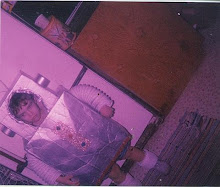I used to spend a lot of time reading Glenn McDonald's music-review site The War Against Silence. It was much more than just a music site, as any random sampling of a 20,000 word Shania Twain review can tell you. Rather, the site was, in McDonald's own words:"a weekly music-review column, and then a weekly column about music, and then a weekly column that was often inspired by music...It was against many things, beginning with but not necessarily including silence, and in favor of many more, including some of the things it was once against and eventually its own end."
The site taught me a lot about music writing, about actually thinking about what music meant, or could mean, to you, and how to actually think about its larger worth. I think the most noteworthy thing about McDonald's writing is that his taste and mine only occasionally overlapped--I had no great interest in Japanese pop bands or Tori Amos records, but I wanted to know what he thought of them, and how his understanding of them could benefit me. I still miss the site.
Anyway, the point I'm getting to is this, from McDonald's review of Low's Christmas EP. It contains one of my favorite pieces of writing on the subject of the holidays, sums up and expresses a lot of similar feelings on my part, and I include it here:
I hate Christmas for a host of small reasons, too, but most of them are variations on two fundamental objections. The first is that at least here in the US, Christmas is the single most egregious and pathologically self-contradictory example of systemic insincerity I regularly encounter, edging out the entertainment industry and the political process. "It's over-commercialized", everybody has been taught to grouse; even dissent has been co-opted, as if the problem is a matter of degree, and the holiday season would be a paragon of cultural discretion if only K-Mart would tone down the graphic design of its December circulars a little. Christmas isn't over-commercialized, it's defined by commerce. The carefully meta-religious phrase "holiday season" isn't informed magnanimity; it's just pandering to a wider audience.
The other big thing I hate about Christmas is that there's virtually nothing good about it that wouldn't be better if it were spread throughout the year. Gift-giving, decorations, baking, holiday parties, sending notes to people with whom you've fallen out of touch, donating to charity: all these noble pursuits, to the extent they are practiced at all, are compressed into a few frantic, resentment-laced weeks, and then forgotten about for the next eleven months. You could contend that without Christmas, even this much wouldn't happen, but I'm not actually that cynical. Take away the inertia towards scheduled solicitude, and I think we would devise healthier alternatives of our own. Without Christmas, I'm almost certain I would do more. I suspect many would. We would celebrate, and give, of our own volition, and in our own terms, and on our own time. And the component of joy, which seems so elusive as we struggle through December traffic snarls and fight like ill-bred zombies over whatever objects' commercials most crassly exploited our emotional vulnerabilities this year, would, I stubbornly believe, have a genuine chance to infuse our actions, rather than being crushed by their logistics. It saddens me, every year, that in a way we never get to find out how good-hearted we are, how willing we would be to touch each other even if the enormous klaxons at Macy's and Amazon.com didn't go off the day after Thanksgiving.
Our real gifts are given the moment we write each other's names on a list, the moment that we realize we care about each other enough to brave the swirling debris of a mangled holiday to include each other in what, if we squint and imagine, it might once have signified.
Moving over to Substack
1 year ago

No comments:
Post a Comment